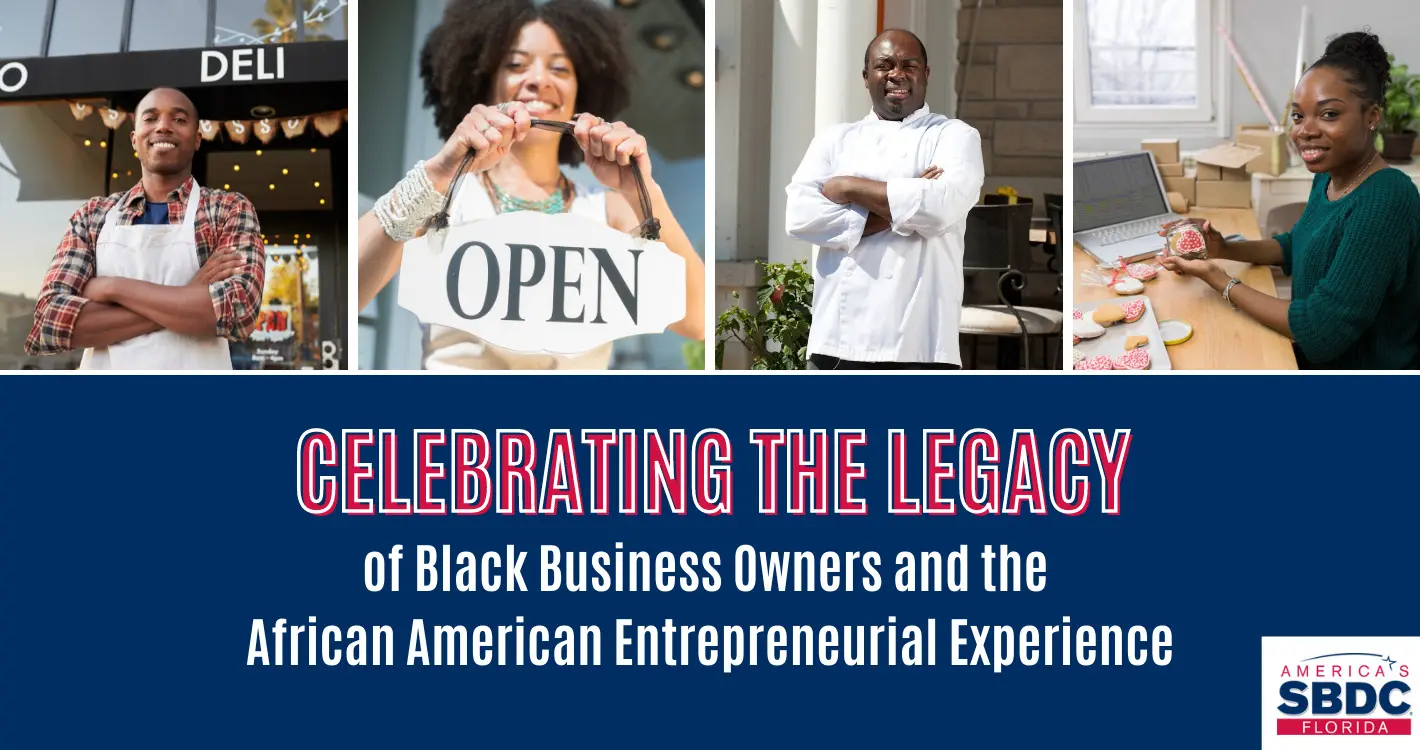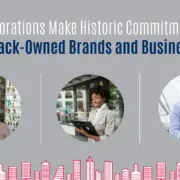Celebrating the Legacy of Black Business Owners and the African American Entrepreneurial Experience

by Yolanda Goodloe | January 19, 2022
Do you ever look at the African American experience and feel pride in all that we’ve managed to accomplish? Blacks are faced with constant change and challenges in the business arena. While managing and operating any business is tough, people of color face many unique obstacles. Black business owners are often marginalized and hindered from accessing financing. In today’s economy, an astounding 7 percent of Black women are starting or running a new business. Given the fact that 61 percent of them are forced to self-fund their total startup capital, this is a major accomplishment for the black business community.
When you look at the systemic barriers black business owners face to start and scale their businesses, the challenges of financial instability, and pressures to succeed, you will understand the courage and commitment that is required to become a business owner, and why they should be celebrated during Black History Month. Some may even argue that it is frankly shocking that minorities strive to become business owners at all. But not only are they overcoming all these various challenges, they are also doing so with little to no outside support.
Celebrating the Black Business Community
The Harvard Business Review released a report in 2021 revealing that the percentage of black women who are in the process of starting or running a new business is higher than that of white women (10 percent) and white men (15 percent). Note that this occurred during a pandemic, when 41 percent of Black-owned U.S. businesses closed.
According to an article by McKinsey and Company, titled “Building supportive ecosystems for Black-owned US businesses” 20 percent of Black Americans start businesses. Because healthy Black-owned businesses could be a critical step towards closing the Black-White wealth gap in this country, the black community and the nation stand to benefit from more minority entrepreneurs running viable businesses.
Truth be told, the first beneficiary of Black-owned businesses and entrepreneurs is the community. A prime example of that is Bronzeville, a district in Chicago, Illinois that used to be a thriving neighborhood, known as the “Black Metropolis.” Between the 1910s and 1950s, it had a thriving economy and was Chicago’s epicenter of Black working, middle, and upper-class culture, and establishments.
Nearly all the businesses in the neighborhood were Black-owned and operated in a relatively self-contained economy. Residents shopped in Black-owned stores, worked at Black-owned businesses, purchased food at Black-owned grocery stores, and put their savings in Black-owned banks.
Later, in an effort to help the local economy, the government brought in larger, newer chain stores, supermarkets, and banks into the neighborhood. As the newer companies were invading Bronzeville, they did not recruit Black workers for management roles or other key positions of responsibility.
While providing lower consumer prices, these chains eventually pushed out the Black-owned businesses because they could not compete. The former business owners were forced to leave Bronzeville for other cities in search of work and the community gradually lost its black middle-class community.
Black-owned businesses invest in the communities where they are located, not only by providing needed services or by boosting the local economy, but also through job creation for the residents.
Challenges Facing the Black Business Community
While a large percentage of Black people are starting businesses, only 4 percent of Black-American businesses make it past the start-up stage into mature businesses. A major reason for this is that Black businesses struggle to access financing. This has become so prevalent that even with strong personal credit, minority and other marginalized business owners are almost 50 percent as likely as their white counterparts to receive full financing.
For the 4 percent of these businesses that make it to maturity, Black-owned businesses disproportionately struggle with debt and raising capital. Nearly 30 percent of these companies spent more than half of their revenue to service their debt in 2019.
Another challenge for Black business owners is their reluctance to use professional services due to the expense, inaccessibility, and mistrust. Only 58 percent sought professional services. In contrast, 70 percent of white business owners utilize them.
According to McKinsey and Company Black business owners face the following barriers, which are linked to racial biases and discrimination in the United States:
- Economic barriers relate to disempowerment and the cost related to the low starting levels of capital
- Market barriers are associated with the unaddressed needs, often related to challenges of access to capital, expertise, and services.
- Sociocultural barriers encompass the biased and exclusionary ways in which Black entrepreneurs are more likely to be blocked from gaining social capital, such as helpful relationships that make up business networks.
- Institutional barriers are the systems in which Black-owned businesses operate and include factors as basic as their locations
Black business owners are faced with a myriad of challenges, some self-inflicted such as the lack of strategic relationships (business coaching, mentors, or networks) and some that are the result of systemic discrimination and racial biases.
The Future of the Black Business Community
The Black-white wealth gap in the United States will cost the economy between $1 trillion to $1.5 trillion per year by 2028. Healthy Black-owned businesses are key to closing this gap. If minority businesses can reach just the average revenue of white-owned businesses (this does not include publicly held companies), that would equal an additional $200 billion in recurring direct revenues. This would mean a $190 billion increase in the gross domestic product (GDP).
The need for Black-owned businesses is not simply a racial issue. It’s not just about the positive impact it will have on Black communities. It’s not just about the impact it will have on job creation within said communities. It’s not just about increasing the number of minorities in the middle to upper-income tax brackets. Although we stand to gain from all those benefits and more.
An increase of healthy black-owned businesses benefits the nation as a whole. Economic growth, a benefit of increasing the GDP, benefits everyone regardless of color, as it leads to higher incomes, reduced poverty, better education, and increased life expectancy.
Black business owners need not only financial support, but also resource support to start and sustain their businesses. Entrepreneurship impacts their mental health as they navigate systemic barriers as they scale their businesses, meet the challenges of financial instability and the pressures to succeed.








Yolanda Goodloe
Consultants, Cowart, Government Contracting Consultants, PinellasFlorida PTAC at Pinellas County Economic Development
Specialty: Procurement
Yolanda Goodloe has more than 20 years of experience in public service at the local and municipal levels. Early in her career, she worked as a human resources and relations professional while serving as a liaison to the business community and advocacy groups. Her prior experience includes being a human relations specialist for Lee County Government, and an equal opportunity director for the City of Fort Lauderdale. Her background combines public service and human relations experience with hands on leadership in equal opportunity, supplier diversity, business certifications programs, organizational training and development, and managing workforce diversity principles. Goodloe is the procurement specialist for the Florida PTAC at Pinellas County Economic Development. She connects businesses to resources and tools for state, local, and federal contracting opportunities. She is a Certified Procurement Professional (CPP), a Supply Chain Management Professional (SCMP), and a Certified Verification Counselor. She graduated from Florida State University with a bachelor of arts in political science and history.